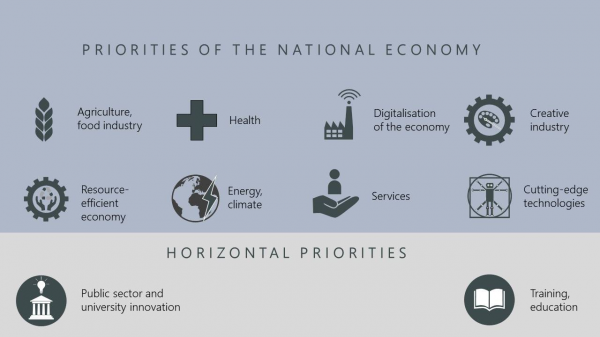In May 2020, the Minister for Innovation and Technology has entrusted the National Research Development and Innovation Office with the management of the implementation and monitoring of S3 during the implementation period of the strategy. With effect from 1 July 2023, the task will be included in the core tasks of the NRDI Office by legislative designation, following the amendment of Government Decree 344/2019.
The existence and the monitoring and evaluation of the fulfilment of S3 is one of the enabling conditions for accessing EU funds in the 2021-2027 period, and, for this reason, the plan document has been sent to the European Commission.
The final version of S3 adopted by the Government is available for download: Smart Specialisation Strategy (S3) 2021-2027.
The Smart Specialisation Strategy (S3) is a policy tool that has been used in the European Union since the 2014-2020 period. In the EU financial programming cycle 2021-2027, smart specialisation strategies are expected to contribute in their implementation to the EU’s “Smarter Europe” policy objective, as well as to the development of regional economies and the strengthening of structural adjustment to industrial transformation and digitalisation.
The development of the National Smart Specialisation Strategy (S3) for 2021-2027 was launched in late 2019 under the professional supervision of the Ministry for Innovation and Technology and coordinated by the NRDI Office. A change compared to the previous strategy is that the 2021-2027 S3 strategy was designed and implemented with the active involvement of the government departments responsible for ICT and enterprise development, in addition to that responsible for innovation.
The S3 priorities were selected using the so-called “entrepreneurial discovery process” (EDP), in line with EU methodological recommendations, and with the involvement of a wide range of stakeholders.

Eight national economic priorities have been selected for S3. These are the directions for the national economy that Hungary is focusing on in the implementation of smart specialisation. Focusing resources on priorities can strengthen competitiveness.
National economic priorities
- Cutting-edge technologies
- Health
- The digitisation of the economy
- Energy, climate
- Services
- Resource-efficient economy
- Agriculture and food industry
- Creative industries
Priorities include Sectoral delimitations: Health, Creative industries, Agriculture, Food, Energy, Climate, and more activity-oriented specialisations: Resource-efficient and digital economy, Cutting-edge technologies.
In addition to the national economic priorities, two horizontal priorities have been selected. The horizontal priorities are designed to provide the skills development and business environment needed for smart specialisation in the sectors covered by the national economic priorities.
Horizontal priorities:
- Training, education
- Innovation of the public sector and universities
In recent years, S3-based programme design in the European Union has become more and more pronounced with the introduction of new S3-based EU funding schemes (e.g. Interregional Innovation Investment Instrument (I3)); and the support of S3-based communities and international cooperation (e.g. S3 Community of Practice, Partnerships for Regional Innovation).






